Why a Harvard graduation speech hit a nerve in China
Even as the Trump administration targets Harvard University and Chinese students, a Chinese student at Harvard University has come under the spotlight for her speech at Harvard’s commencement, with questions about her connections and how she got into Harvard. Lianhe Zaobao’s China Desk explores the speculation and discussion.
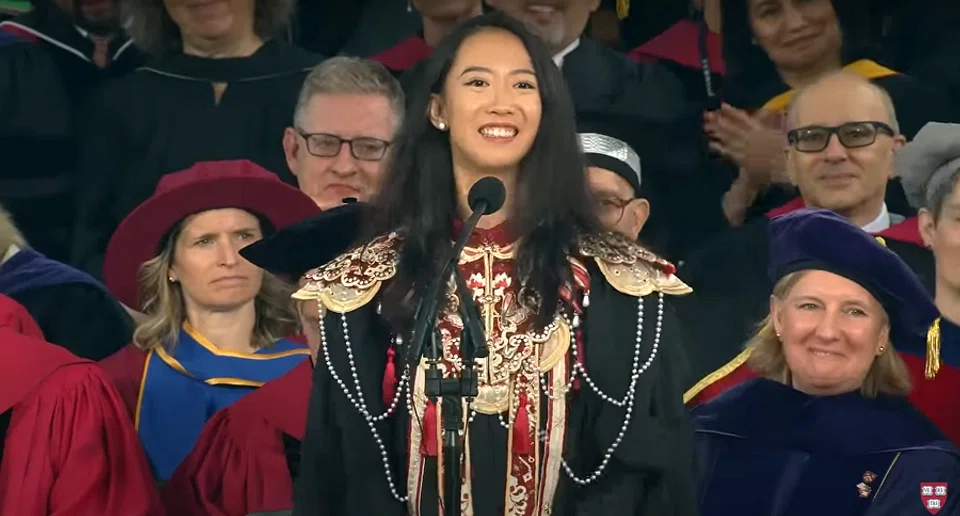
Amid US President Donald Trump’s heavy offensive against Harvard University, a Chinese female graduate’s commencement speech at the university has become the latest topic of public discussion.
Last week, Luanna Jiang Yurong addressed the school as a representative of Harvard’s graduating class, praising Harvard for embracing international students and emphasising the importance of maintaining diversity and internationalisation. While her remarks earned online applause, her rapid rise to fame also sparked controversy over her background as a guan erdai (官二代, the second generation of officials) and her educational journey.
Targeting Harvard and Chinese students
Harvard University has been shrouded in tension and unease this graduation season. On 22 May, the US Department of Homeland Security announced the termination of Harvard University’s Student and Exchange Visitor Program certification, effectively barring the university from enrolling international students.
This was followed by an announcement from US Secretary of State Marco Rubio on 28 May, indicating that the US would begin revoking visas for Chinese students and revise visa criteria to enhance scrutiny of all future visa applications from mainland China and Hong Kong.
With an atmosphere of a chilling witch hunt hanging over US academia, Jiang, as one of three student representatives chosen to speak at Harvard’s commencement ceremony, delivered her address titled “Our Humanity” on 29 May.
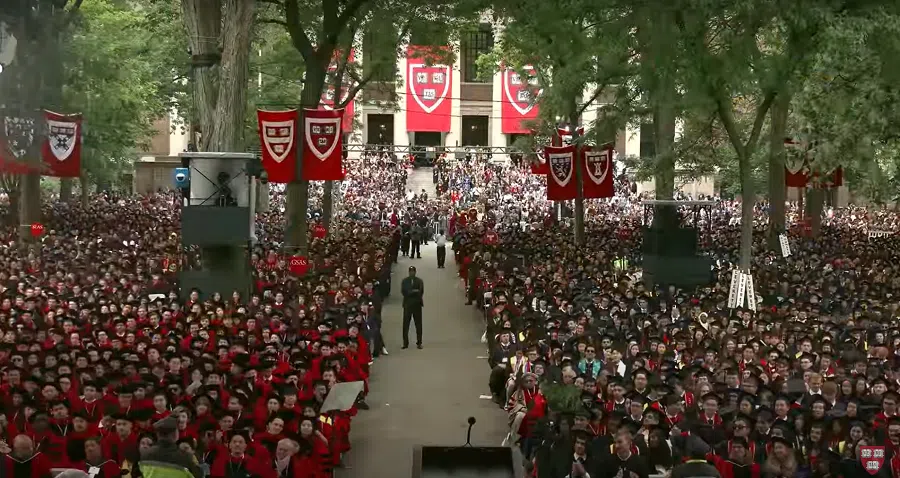
As the first Chinese woman in Harvard’s nearly 400-year history to speak at a commencement event, Jiang’s speech naturally attracted significant public attention.
Jiang’s address
She opened her address with a personal anecdote of a humorous incident from last summer during her internship in Mongolia, where she received a call from two Harvard classmates in Tanzania who were struggling to operate a washing machine. Faced with labels written entirely in Chinese, the two students, one from India and the other from Thailand, resorted to Google Translate. The app hilariously translated “quick wash” into “spinning ghost mode”, much to their amusement and confusion.
“There we were: an Indian and a Thai calling me, a Chinese in Mongolia, to decipher a washer in Tanzania. And we all study together here at Harvard,” she said.
Jiang graduated from Harvard Kennedy School’s master’s programme in public administration in international development, as part of a class comprising 77 students from 34 different countries.
In her speech, she praised her school’s internationalisation and diversity while expressing concern that the global community’s worldview is increasingly threatened. She urged her peers to maintain empathy despite the “division, fear, and conflict” prevalent in the US.
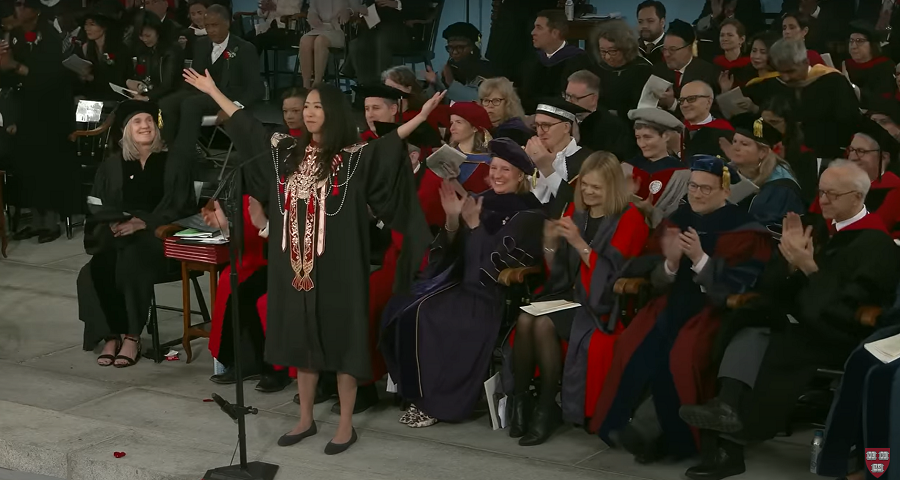
In her address, Jiang also encouraged people to listen to one another without judgement and to seek common ground rather than conflict. She said, “If we still believe in a shared future, let us not forget: those we label as enemies — they, too, are human. In seeing their humanity, we find our own. In the end, we don’t rise by proving each other wrong. We rise by refusing to let one another go.”
Even more netizens focused on Jiang’s background, revealing that she is the daughter of Jiang Zhiming, executive director of the China Biodiversity Conservation and Green Development Foundation (CBCGDF), a special fund in China...
Reactions to Jiang
The speech not only received applause from the audience but also quickly became a trending topic on Weibo. Chinese netizens left numerous comments praising the speech, describing it as filled with the idealistic glow of advocating equality and inclusion — “Children with a global perspective indeed think differently,”; “She has more vision than the American president,” and “The world needs people with such a sense of the ‘greater good’.”
Media reports indicate that 25-year-old Jiang was born in Qingdao, Shandong province, and attended Qingdao No. 65 Middle School, where she served as a class representative in charge of studies. Her excellent academic performance earned her a full scholarship to attend high school in Cardiff, Wales.
She then completed her undergraduate studies in economics at Duke University in the US. After graduating, she worked as an economic analyst at Credit Suisse for three years, followed by a year in private equity. Driven by her concern for global poverty and a desire to advance women’s rights, she enrolled in the Harvard Kennedy School to pursue a master’s degree.
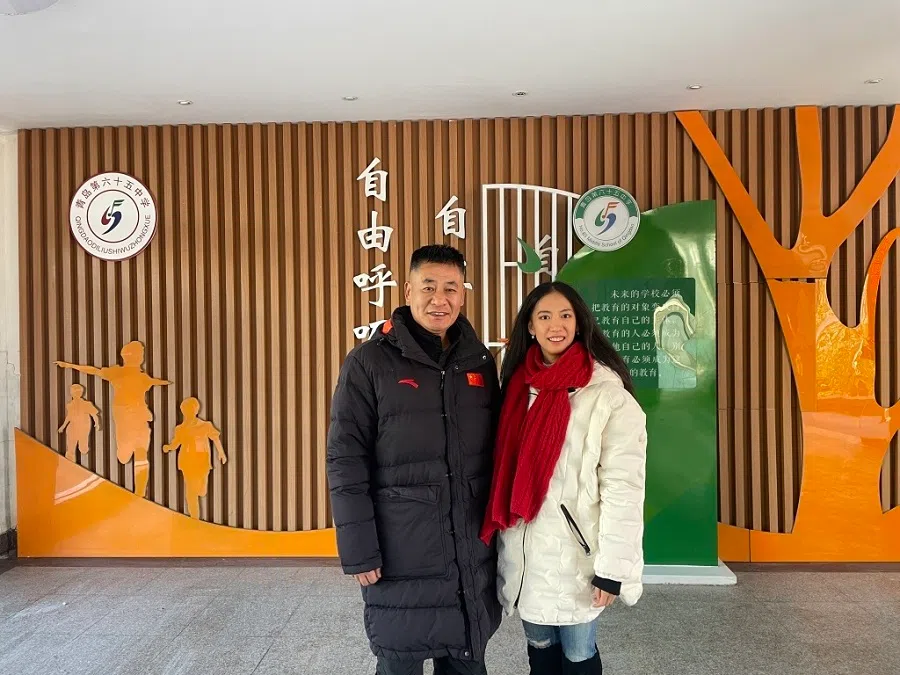
In an interview with Shandong media outlet Dazhong News (大众新闻), Jiang’s former middle school form teacher Lü Hongchang said in praise: “She showed us the composure and confidence of Chinese students on the world stage.”
Attracting trouble?
However, over the past couple of days, some people have started criticising Jiang’s speech as self-indulgent and a modern-day version of “let them eat cake”, not a solution to real-world challenges and problems.
Even more netizens focused on Jiang’s background, revealing that she is the daughter of Jiang Zhiming, executive director of the China Biodiversity Conservation and Green Development Foundation (CBCGDF), a special fund in China, and that she entered Harvard via a recommendation by Zhou Jinfeng, vice-president and long-term secretary-general of the same foundation.
The CBCGDF is a national public welfare foundation approved by China’s State Council. According to a report by The Paper, Jiang Zhiming publicly thanked Zhou when his daughter was admitted to Harvard in 2022.
Some netizens even calculated that attending Harvard would cost at least 700,000 RMB (approximately US$97,164) per year in tuition and living expenses.
The topic “Chinese girl caught in a dilemma at Harvard speech” trended on Weibo on 1 June. Anti-establishment netizens criticised Jiang’s speech for its resemblance to China’s “Great Overseas Propaganda” (大外宣) narrative, while other netizens believed her speech and attire conformed to Western society, thus raising questions as to whether the CBCGDF with its close ties to Jiang has fallen to being an agent manipulated by the West to infiltrate China through ideological influence.
Some netizens even calculated that attending Harvard would cost at least 700,000 RMB (approximately US$97,164) per year in tuition and living expenses. Given that Jiang was able to study abroad through a recommendation, and that she would return to China as an academic star joining the upper echelons of society, some have asked: since her father was uncovered to be the executive director of the CBCGDF, is this another case of “getting one’s father in trouble” (坑爹)?

Last month, China saw a similar incident that was the talk of the nation.
Chinese actress Huang Yang Tian Tian, 17, wore a pair of emerald earrings belonging to her mother to pair a dress for her coming-of-age ceremony, and shared a slew of photos online with her fans. Netizens identified the earrings as being worth 2.3 million RMB, which was not commensurate with her family’s income level.
Huang’s father, Yang Wei, later issued a statement, claiming that the earrings were replicas, but it did not quell the controversy. On 22 May, officials announced that Yang was under investigation for his alleged engagement in illegal business activities while being a civil servant, and for concealing the illegal birth of a second child.
Though she was very clear how much luckier she was compared to others — as her family could afford four years of tuition fees in the UK — her Harvard graduate tuition was covered by exhausting all her savings.
Jiang clarifies enrolment legitimacy
Amid the sudden controversy, Jiang opened several social media accounts on 2 June and wrote posts to clarify that she did not get into Harvard through the back door.
She revealed her struggles growing up, saying her parents separated and divorced when she was young, she had little contact with her father, and she moved from place to place with her mother. Jiang also said she attended a middle school with poor standards, where she was bullied.
Jiang went on to explain that in her second year of high school, she managed to secure admission to one of the UK’s most academically rigorous high schools. She later studied philosophy, politics, and economics at the University of Warwick, and in her third year, she transferred to Duke University in the US on the strength of her grades.
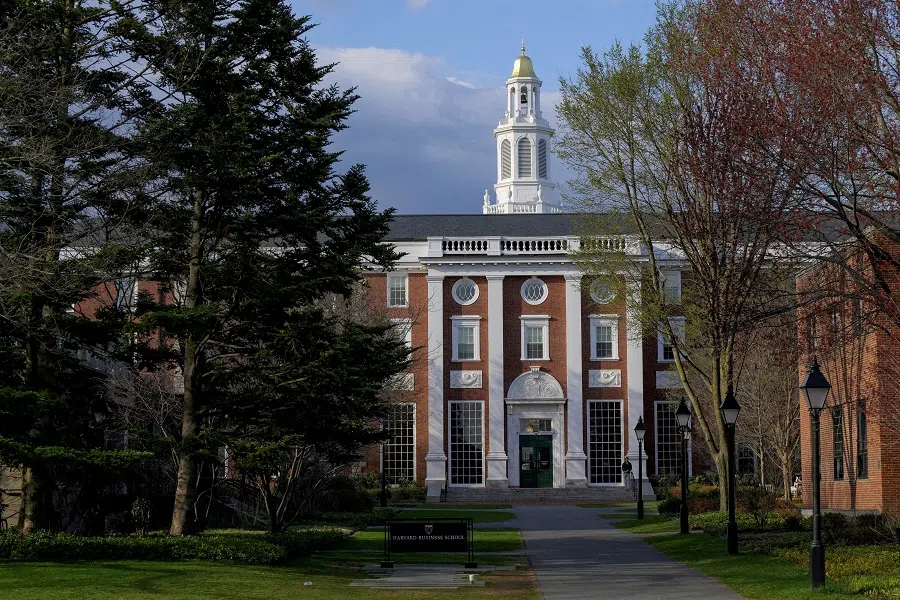
On her Harvard application recommendations, Jiang said she submitted three recommendation letters; two from her mentors at Duke University and one from a team leader when she worked at Credit Suisse. She admitted to having interned at the CBCGDF where her father was a high-ranking executive, and had also received a recommendation letter — but due to Harvard’s cap on the number of recommendation letters, she ultimately did not submit the recommendation from the CBCGDF.
Jiang also added that she is not a “main character” as she comes from a broken family, with her parents absent for extended periods. Though she was very clear how much luckier she was compared to others — as her family could afford four years of tuition fees in the UK — her Harvard graduate tuition was covered by exhausting all her savings.
Jiang clarified that her Harvard graduate tuition came from nearly four years of savings from work after graduating from her undergraduate studies. As she had to work an extra year to save up enough money for school, she even had to delay her Harvard enrolment by a year.
In recent years, with China’s economic recovery sluggish, public dissatisfaction with the privileged class has continued to climb, alongside an increased aversion to elite education.
Scepticism and hostility
However, many netizens remained sceptical. Some pointed out that Jiang’s self-proclamation of being a victim of bullying in middle school did not gel with the school’s depiction of her as a “stellar graduate”. Others questioned how Jiang — who was supposedly distant from her father — secured an internship and recommendation letter from the CBCGDF.
In recent years, with China’s economic recovery sluggish, public dissatisfaction with the privileged class has continued to climb, alongside an increased aversion to elite education. Chinese students with the means to study abroad are more likely to face hostility rather than approval in lieu of the current public opinion climate.
With tensions between the Trump administration and elite universities in the US continuing to escalate, as well as Chinese public opinion on overseas students becoming increasingly complex, Jiang’s “fame” might on the contrary prompt more Chinese students to hold their tongues amid this storm, in order to avoid being sucked into unnecessary controversy and be subjected to vitriol from both East and West.
This article was first published in Lianhe Zaobao as “哈佛中国女硕士走红也酿“坑爹”事件?”.

![[Big read] Paying for pleasure: Chinese women indulge in handsome male hosts](https://cassette.sphdigital.com.sg/image/thinkchina/c2cf352c4d2ed7e9531e3525a2bd965a52dc4e85ccc026bc16515baab02389ab)


![[Big read] How UOB’s Wee Ee Cheong masters the long game](https://cassette.sphdigital.com.sg/image/thinkchina/1da0b19a41e4358790304b9f3e83f9596de84096a490ca05b36f58134ae9e8f1)
